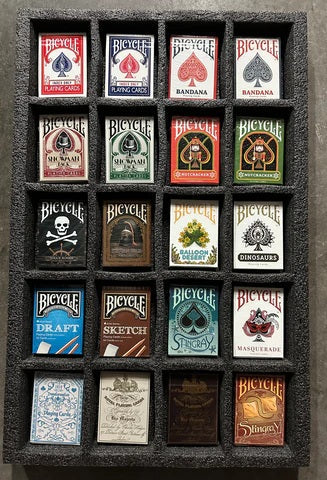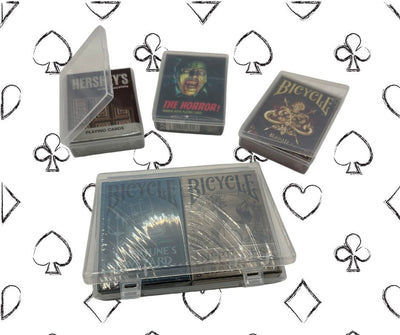(A player selecting a card from the stock pile in a game of Rummy)
Card Game Rules
Rummy or Rum is a traditional card matching game that requires 2-6 players and a standard 52 playing card deck with Kings high and Aces low. The objective of Rummy is to have the most points at the end of the game.
For more Rummy type games, check out our guides for Gin Rummy and Canasta.
If you are looking for cards to play Rummy with, check out a standard pack here or one of our more recent arrivals here.
Set Up
Before game play can begin, a dealer must be selected. Each player draws one card from a shuffled deck. The player with the lowest card becomes the dealer.
The dealer shuffles the deck and passes out cards clockwise for each player. If two people play, then each player receives 10 cards. For three or four players, each receives 7 cards. For five or six players, each receives 6 cards. The remaining cards are placed faced down in the center of the group to form the stock. The top card of the stock is flipped face up and placed next to the stock to form the discard pile.
How to Play
Play begins with the player to the left of the dealer. Every turn begins with the player selecting one card from either the stock or the discard pile. If at any point in the game the stock pile runs out, the discard pile is shuffled to form a new stock pile. The last card in the new stock pile becomes the first card in the discard pile. The general goal of the game is to get rid of your cards as fast as possible. This can be done is three ways: Melding, Laying Off or Discarding
Melding

(Examples of possible melds in Rummy. This particular game included the Joker in the deck)
A player makes a meld by either having three or more of a kind or by having three or more of a run. A run is made of three or more cards of the same suit in increasing or decreasing order. When a player makes a meld they must lay it face up on the table. Melding is optional and you can only do it once a turn.
Laying Off
A player may also get rid of cards by building upon previously made melds. For instance, if a player has made a meld of 3 Kings and the player in play has the fourth King, they may place it on the 3 King meld to complete the set. Likewise, if a meld is made of the 2, 3, and 4 of clubs and the player in play has the Ace of clubs, they may place it before the 2 to build upon the run. Laying Off is optional and there is no limit to the number of Lay Offs you can make.
Discarding
At the end of every turn, you must choose one card to add to the discard pile.
Scoring
When one player gets rid of all of their cards, all players stop and tally up their points based on the remaining cards in their hand. Points are given by card value with Aces counting as 1 point and face cards counting as 10 points. The tallied points are given to the one who got rid of their cards first.
Rummy
Some can declare Rummy if they get rid of all of their cards in only one move. This can be done by opting out of making moves and strategically waiting for the right runs and melds to appear on the table. For the person who can declare Rummy, points are doubled.
Game Play Example
Suppose the deck has been dealt, there’s a King of Hearts in the discard pile, and you have the King of Spades, the 5, 6, 7 of Diamonds, and the 2, 8, Jack of Hearts. The player to your right places a meld of three 2s on the table and discards. It is your turn. You begin by selecting a card from the stock pile and get a King of Diamonds. You place the run of Diamonds on the table and lay over the 2 of Hearts on the meld of 2’s. You then discard the Jack of Hearts. After your turn you have the King of Spades, the King of Diamonds and the 8 of Hearts. A round passes and a meld of 8's has been placed. At the start of your turn you select from the stock pile and receive a King of Hearts. You place the meld of Kings on the table and discard the 8 of Hearts, making you win the game.
For more resources Rummy check out Pagat's article on the game here and David Parlett's entry in Britannica here.
History
Rummy-styled games have a long history with their origins either tracing to the Chinese game of Khanhoo or the Mexican game of Conquian. Khanhoo, comparatively, is much more archaic. It was first recorded during the Ming Dynasty in 1613. While the basic premise of strategic card matching can be found in Khanhoo, traditional Rummy has evolved significantly since then. Conquian as an official game was first recorded in 1852, however, some believe it originated hundreds of years earlier. Other than having a 40-card deck (normally 8, 9, and, 10 are removed), much of Conquian is similar to the basic Rummy described above.
Variations
While there are many Rummy-like games, these variations are closer to the basic Rummy with only slight differences.
For a comprehensive list of games related to Rummy, Check out this Wikipedia page here
500 Rum
In this variation, a player wins when they reach 500 points. Instead of the player who lays off all of their cards first getting the tallied points of the losers' remaining hands, all players are eligible for winning points once a player lays off their cards.
When one player goes out, play ends and everyone tallies the difference between the point value of their melds and the point value of their remaining cards.
Knock Rummy
In Knock Rummy, players cannot lay off on another hand nor can they place their melds on the table. Instead, players keep their hands hidden from other players until the very end when they can go out.
Queen City Rum
In Queen City Rum, 7 cards are dealt to each player no matter how many players there are. Players must also wait until they can play their entire hand at once. No partial melds are allowed.
Contract Rummy
In Contract Rummy, players must make a specific meld before they can meld any cards they want. The specific meld, or contract, changes each round.
Continental Rummy
The set up for Continental Rummy is the same as regular rummy.
In Continental Rummy, players can only meld cards in the following ways:
Boat House Rum
Boat House Rum is like regular rummy with some additional rules. On a player's first turn they may take two cards from either the discard pile or stock. Aces are worth 11 points. A player does not have to make a meld if they can. If a player is able to lay down all of their cards without putting down any before, the other players pay double points to the winner.
Arlington
Arlington is a rummy game where 2s and Jokers are wild. Arlington also has a different scoring system than regular rummy.
In Arlington, melded cards are worth the following points.
Recommended products to play Rummy:

Rummy 2 Deck Set Bicycle Playing Cards
Looking for more card games to play? Check out this article:
40+ Great Card Games For All Occasions
About the author: John Taylor is a content writer and freelancer through the company Upwork.com. You may view his freelancing profile here. He has a B. A. in English, with a specialty in technical writing, from Texas A&M University and a M. A. in English from the University of Glasgow. You may view his previous articles about card games here and his LinkedIn profile here.






16 comments
Good article
Good post
Im very happy to find this web site. I need to to thank you for ones time for this particularly wonderful read!! I definitely liked every bit of it and I have you saved to fav to check out new stuff on your website.
Rummy is a classic card game that requires strategy and skill to win. With its easy-to-learn rules and simple gameplay, Rummy is a great choice for anyone looking for a fun and challenging card game. Whether you’re playing with friends and family or competing in a more serious setting, understanding the basic rules of Rummy is the key to success. By creating sets and runs of cards and being the first player to go out, you can become a Rummy champion in no time!
How do you play the ace?
Ace, 2,3
Ace, king, queen
Clarifying a rule… is queen, king, ace, 2 acceptable? Or king, ace,2 e?